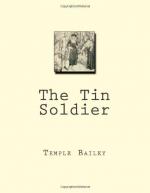Among the shadows a young man shrank in his seat. His vision was not of Democracy, but of a freezing night—of a ragged old voice rising from the blackness of a steep ravine—
“Oh, be swift, my soul—to
answer—Him—
Be jubilant my feet—”
Why had Drusilla chosen that of all songs? Oh, why had she sung at all?
A maid came in to say that Mr. Drake was wanted at the telephone. The message was from Dr. McKenzie. The General was much worse. It might be well for Derry to come home.
So Derry, with a great sense of relief, got away from the frigid Captain, and from the flaming Drusilla, and from Peggy with her flushed air of apology, and went out into the stormy night. He had preferred to walk, although his shoes were thin. “It isn’t far,” he had said when Margaret expostulated, “and I’ll send my car for Drusilla and Captain Hewes.”
The sleet drove against his face. His feet were wet before he reached the first corner, the wind buffeted him. But he felt none of it. He was conscious only of his depression and of his great dread of again entering the big house where a sick man lay in a lacquered bed and where a painted lady smiled on the stairs. Where there was nothing alive, nothing young, nothing with lips to welcome him, or with hands to hold out to him.
He found when at last he arrived that the Doctor had sent for Hilda Merritt.
She came presently, in her long blue cloak and small blue bonnet. Hilda made no mistakes in the matter of clothes. She realized the glamour which her nurse’s uniform cast over her. In evening dress she was slightly commonplace. In ordinary street garb not an eye would have been turned upon her, but the nun’s blue and white of her uniform added the required spiritual effect to her rather full-blown beauty.
As she passed the painted lady at the head of the stairway she gave her a slight glance. Then on and up she went to her appointed task.
“It is pneumonia,” Dr. McKenzie told Derry; “that’s why I wanted Miss Merritt. She is very experienced, and in these days of war it is hard to get good nurses.”
Derry found his voice shaking. “Is there any danger?”
“Naturally, at his age. But I think we are going to pull him through.”
Derry went into the shadowed room. His father was breathing heavily. Something clutched at the boy’s heart—the fear of the Thing which lurked in the darkness—a chill and sinister figure with a skeleton hand.
He could not have his father die. He would feel as if his thoughts had killed him—a murderer in intention if not in deed. Not thus must the Obstacle be removed. He raised haggard eyes to the Doctor’s face. “You—you mustn’t think that I store things up against him. He’s all I have.”
The Doctor’s keen glance appraised him. “Don’t get morbid over it; he has everything in his favor—and Miss Merritt is famous in such cases.”




